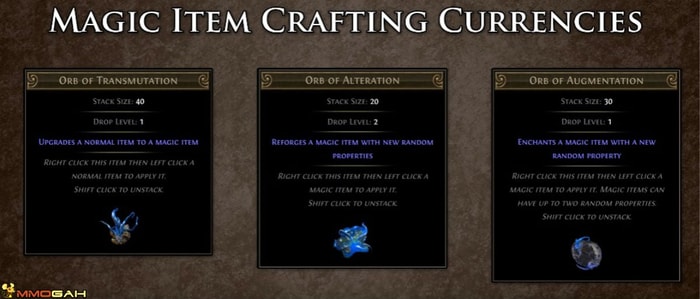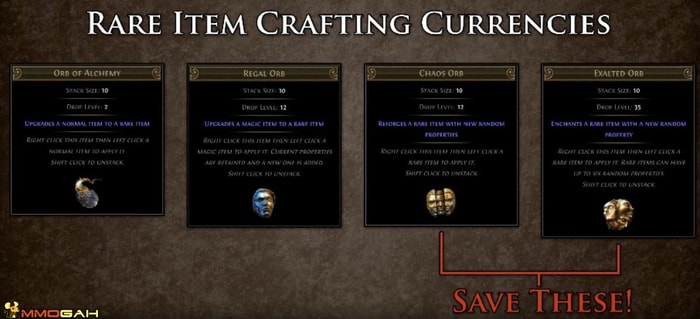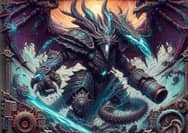Dear Exiles! The Professional Gaming Store MmoGah will show you PoE Currency Guide. Now one thing that really differentiates Path of Exile from other games, is its Currency System. There is no gold in PoE, all currency is in the form of orbs that can create or alter all PoE Items of the four rarities: normal, magic, rare or unique.

Rarities:
Normal Items - Are just the white base item with no affixes.
Magic Items - Are blue items and can have 2 affixes, 1 prefix and 1 suffix.
Rare Items - Are yellow items and can have 6 affixes, 3 prefixes and 3 suffixes.
Unique Items - Are orange items and can have a variable amount of affixes and special modifiers.
Now let’s look at the currency system and how it can affect these items. Starting from the bottom, we will look at the lowest tiers of currency:
Scroll of Wisdom - Identifies the desired item. It is the most commonly used currency to identify all dropped items that are above the normal rarity.
Portal Scroll - It is used to create a portal that brings you back to the current act’s town. It can only be used once both ways and then it disappears and a new one will have to be made.
Quality Enhancing Currency
These currencies perform in similar manner. Every item, aside from jewelry, can be improved to a +20% quality. When using one of these PoE Orbs on an item, you will gain +5% quality if the item is normal, +2% quality if it is magic and +1% quality if it is rare.

Blacksmith’s Whetstone - Improves the quality of a weapon. Only affects the physical implicit damage of a weapon and not the explicit properties.
Armourer’s Scrap - Improves the quality of an armour. Only affects the implicit property of a gear piece, not the explicit properties.
Glassblower’s Bauble - Improves the quality of a flask, extending its duration.
Cartographer’s Chisel - Improves the quality of a map, increasing its overall quantity modifier.
Gemcutter’s Prism - Improves the quality of a gem. This can have different effects, depending on the gem.
Creating and Modifying Magic Items
These orbs carry low value and are best used to re-roll gear and flasks while leveling.

Orb of Transmutation - Upgrades a normal rarity item to a magic item with a random affixes.
Orb of Alteration - Re-rolls a magic item with new random affixes. Could only roll a prefix or suffix, or both.
Orb of Augmentation - Adds the missing prefix or suffix of a magic item.
Creating and Modifying Rare Items
These orbs carry medium to high value and are best used on gear found later in the game or to trade for better gear.

Orb of Alchemy - Upgrades a normal item to a rare item with a random amount of affixes.
Regal Orb - Upgrades a magic item to a rare item, retaining the affixes on it, and adding one more random one.
Chaos Orb - Re-rolls a rare item with new random affixes. Just like an alteration, it can roll any number of affixes. Between 1-3 prefixes, and 1-3 suffixes.
Exalted Orb - Adds an affix to a rare item, as long as it has an open affix slot.
It is recommended to save chaos and exalted orbs, as they carry a lot of value and should not be used for crafting low level items. Chaos is best save for end game crafting and crafting Map Items. Chaos is also one of the main trading currencies for Buying All Types of PoE Items. Only use Exalted Orbs if you know what you are doing.
Creating and Modifying Unique Items
Orb of Chance -Upgrades a normal item to a random rarity. This means the item could become a magic, rare or unique item (if there is one of that base item type). This is the only way to craft a unique item other than finding one as a drop or trading for it. The chances of rolling a unique is generally very low, but worth trying if it is a valuable unique.
Orb of Scouring - Removes all properties from an item, returning it to normal rarity.
Blessed Orb - Re-rolls the implicit property of an item, regardless of the rarity.
Divine Orb - Re-rolls the explicit properties of an item, regardless of the rarity.
Socket Modifying Gear
Jeweller’s Orb - Re-rolls the number of sockets on an item.
Orb of Fusing - Re-rolls the links between sockets on an item. Items can have up to the same number of links as the number of sockets. Crafting a 6 link has quite a small chance and could happen with one fusing or thousands.
Chromatic Orb – Re-colors the sockets of an item. The sockets will have an affinity to the attribute of the respective base item. So an intelligence based item will have better chances at rolling blue sockets, over red and green sockets.
Assorted
Orb of Regret - Provides a passive respect point upon use.
Vaal Orb - Corrupts an item modifying it unpredictably. Once corrupted, the item properties cannot be changed. Depending on the base item type, many different things can happen, majority of them are not good, so it is recommended to not use these on gear until you fully understand what they do.
Mirror of Kalandra - Creates a mirrored copy of an item.
These orbs are over 1 thousand times as rare as an Exalted Orb, leaving it as one of the most expensive currencies in the game, as it can literally duplicate items. Mirrored items, similar to corrupted items, cannot be modified in anyway.
Special Type Currencies
Silver Coins - These were introduced with the Prophecy league, and can be traded in to Navali in town after rescuing her from the climb. These provide you with a new prophecy, 1 per coin. These can also be used to seal prophecies and remove them from your prophecy list.
Essences - Were introduced with the Essence league, and are a complex system of crafting currency. There are designed to help players craft an item with one determined affix, while the rest are random. There are 25 different bases of essences and they can be upgraded to higher tiers, increasing their power. Essences are obtained from frozen essence monsters that can spawn randomly in zones.
Divination Cards - These are not so much a currency, but rather a system that allows a player to semi-deterministically gain an item, item base or currency. They are single slot items that stack, and once a stack is completed, the player can trade the full stack into Tasuni in the Act IV town, Highgate.
Cartographer's Sextant - These currencies are used in the end game mapping system. These are not used on items, but the endgame atlas, which is a map of all of the maps within the game. They provide special modifications to a map and maps within a certain range, similar to affixes, but with a set number of uses. You need not worry about using this currency as a beginner, and can hold onto them.
That’s all about this PoE Goods guide. And you can also watch the original video to learn more details. If you want to Buy PoE Currency or learn about more PoE Beginners Guide and PoE Builds, you can come to MmoGah. You will be treated like a god here.



